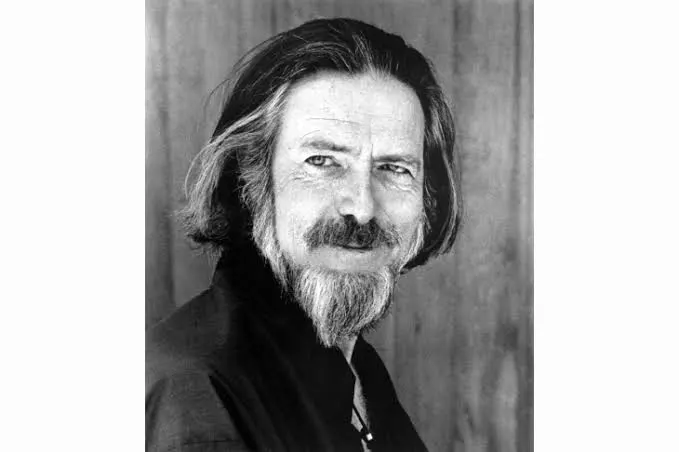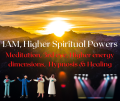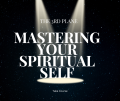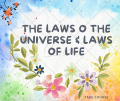
American Philosopher Alan Watts, often discussed the parallels between Eastern mysticism and Western psychotherapy. Watts in this 1971 lecturer argues that both explore altered states of consciousness, contrasting this with Western religions’ focus on doctrine and behavior. He critiques Western psychology’s tendency to pathologize non-normative experiences, drawing parallels to religious dogma and persecution of heresy. The discussion culminates in a playful, interactive segment where Watts plays the role of a patient believing himself to be God, prompting audience questions and insightful reflections on consciousness, responsibility, and the nature of reality. Finally, he emphasizes the importance of embracing one’s experience fully rather than seeking external validation or solutions.

Here are key take aways in the form of questions and answers from the video to help you think about awakening to your true self. The video is in this article.
1. What is the central point of disagreement between Western psychology and Eastern religions regarding states of consciousness?
Western psychology generally views altered states of consciousness, those that deviate from the norm, as a form of illness. This stems from the 19th-century scientific worldview that sees nature’s energy as ‘blind’ and human consciousness as superior. In contrast, Eastern religions, especially those like Hinduism, Buddhism, and Zen, often consider altered states of consciousness as pathways to spiritual insight and enlightenment.
2. How does Alan Watts compare modern psychiatry to the religious practices of the Middle Ages?
Watts draws a parallel between modern psychiatry and the Church in the Middle Ages, arguing that both institutions function as gatekeepers of what is considered ‘sane’ or ‘orthodox’ experience. He points out that psychiatrists, like the priests of the past, wield significant authority in defining and controlling human behavior. He contends that the “myth of mental illness,” as described by Thomas Szasz, reinforces this authority and can lead to the arbitrary deprivation of civil liberties for individuals who exhibit unorthodox states of consciousness.
3. According to Watts, what is the “great heresy” in Western religion, and why?
Watts identifies the belief that one is God (or one with God) as the “great heresy” in Western religion. He cites Jesus Christ’s claims of divine unity as an example, arguing that such assertions challenge the established hierarchical structure of Western religious thought. Claiming to be God is seen as an act of insubordination against the cosmic order.
4. What is the significance of understanding oneself as God, according to Watts?
For Watts, understanding oneself as God translates to feeling a profound sense of connection and unity with the universe. This realization dispels feelings of alienation and hostility towards the world. It fosters a sense of responsibility for one’s actions and an acceptance of reality as “my karma,” a personal creation.
5. How does Watts address the problem of boredom in the context of human existence?
Watts sees boredom as the flip side of creativity. He suggests that boredom arises from a lack of engagement with the present moment and a constant desire for something different. His playful solutions include embracing the unexpected (“pressing the button labeled surprise”) and transforming mundane activities into a “dance” by approaching them with a playful, non-serious attitude.
6. How does Watts respond to the question of alleviating evil in the world?
Watts argues that the world is constantly improving in an undulatory process, with upswings and downswings. He suggests that attempting to forcefully eliminate evil without a deep understanding of its nature can lead to unforeseen consequences. He emphasizes personal responsibility as the starting point for positive change.
7. What is the role of chance in a universe where everything is God?
Watts views chance (or randomness) as an essential counterpart to order. He explains that order and randomness are interdependent concepts, defining each other through contrast. Without randomness, order would be meaningless, just as a world without space would have no room for stars.
8. What is the potential danger of embracing the idea that “everyone is God”?
While Watts champions the idea of recognizing one’s inherent divinity, he also cautions against its misapplication. He warns that individuals who believe they are God might fall into the trap of “playing God” by trying to control and manipulate the world according to their limited understanding, leading to potentially harmful outcomes. He emphasizes the importance of aligning one’s actions with a deep understanding of the interconnected nature of the universe.
Alan Watts on Being God: A Study Guide
Quiz
Instructions: Answer the following questions in 2-3 sentences each.
- According to Watts, how do Western psychology and religion differ in their approaches to states of consciousness?
- Why does Watts compare psychoanalysis to Newtonian mechanics and religion?
- What are some of the dangers Watts sees in the “officialization” of psychiatry?
- Explain the central heresy that Watts identifies in Western religion, particularly Christianity.
- How does Watts relate the concept of “being God” to feeling connected with the universe?
- What does Watts mean by “karma” and how does it relate to personal responsibility?
- Why does Watts use the analogy of a clinical experiment with himself as the “patient” who believes he is God?
- How does Watts use the example of Satan to illustrate the concept of necessary duality in the universe?
- What is a “koan” and how does Watts use it to address the question of why we should love one another?
- How does Watts connect the concepts of boredom and creativity?
Answer Key
- Western psychology tends to pathologize non-ordinary states of consciousness, viewing them as illnesses to be treated. Western religion focuses on behavior, doctrine, and belief, with less emphasis on the transformative potential of altered states.
- Watts suggests psychoanalysis, like Newtonian mechanics, operates on a deterministic model, viewing psychic energy as a “blind” force. He compares psychoanalysis to religion because of its rituals (e.g., the couch), hierarchy (e.g., apostolic succession), and claims to specialized knowledge.
- Watts argues that the officialization of psychiatry creates a system of control similar to the medieval church, with psychiatrists acting as arbiters of sanity and heresy. This leads to the marginalization and mistreatment of individuals with unconventional states of consciousness.
- The central heresy, according to Watts, is the belief in one’s own divinity, exemplified by Jesus’ claim to be God. This challenges the monarchical structure of Western religion and introduces the idea of “democracy in the Kingdom of Heaven.”
- For Watts, “being God” means experiencing a profound connection with the universe, a sense of belonging and unity with the energy that animates all things. This contrasts with feeling alienated and hostile towards the world.
- Watts defines “karma” as “doing,” emphasizing personal responsibility for one’s actions and experiences. He suggests that accepting one’s karma means saying “yes” to life, acknowledging the interconnectedness of all things.
- By positioning himself as the “patient” claiming to be God, Watts invites the audience to engage with the idea of divine consciousness in a playful and experiential way, challenging conventional notions of sanity and challenging listeners to examine their own assumptions.
- Watts presents Satan as the “district attorney” in the cosmic court, representing the necessary aspect of negativity and challenge in the universe. This highlights the importance of duality and the interconnectedness of seemingly opposing forces.
- A “koan” is a paradoxical Zen riddle designed to provoke spiritual insight. Watts uses the question of loving one another as a koan, suggesting that the commandment itself reveals something about the nature of reality and our interconnectedness.
- Watts views boredom as the “yin” to creativity’s “yang.” Boredom arises from the latent potential of creative energy, and can be transmuted into joyful engagement through mindfulness and a playful approach to life’s tasks.
Essay Questions
- Analyze Watts’ critique of the scientific naturalism of the 19th century and its influence on Western psychology. How does this worldview shape our understanding of consciousness and mental health?
- Explore Watts’ comparison of Western therapy and Eastern religions. What are the strengths and limitations of each approach in addressing the human experience of altered states of consciousness?
- Discuss the implications of Watts’ assertion that “to know that you are God is another way of saying that you feel completely with this universe.” How might this understanding affect one’s relationship with oneself, others, and the natural world?
- Examine Watts’ argument that “life itself is a disease with a very poor prognosis.” What is the significance of this statement and how does it relate to his broader message about embracing the present moment and the totality of experience?
- Analyze Watts’ use of humor, storytelling, and paradox in his exploration of complex philosophical and spiritual concepts. How do these techniques enhance the accessibility and impact of his ideas?
Glossary of Key Terms
- Cosmic Consciousness: A state of awareness characterized by a profound sense of unity with the universe and all of existence.
- Mystical Experience: A direct, non-dualistic experience of ultimate reality, often described as ineffable and transformative.
- Apostolic Succession: A concept in some Christian traditions that emphasizes the unbroken lineage of authority passed down from Jesus to his apostles and subsequent church leaders.
- Heresiarch: A leader or founder of a heresy, a belief or teaching that contradicts established religious doctrine.
- Blasphemy: The act of showing disrespect or irreverence toward something considered sacred or divine.
- Karma: In Sanskrit, “doing” or “action.” Often understood as the principle of cause and effect, where actions have consequences that shape future experiences.
- Koan: A paradoxical riddle or question used in Zen Buddhism to provoke spiritual insight and challenge conventional thinking.
- Yang and Yin: Complementary forces in Chinese philosophy representing opposing yet interconnected principles such as light and dark, active and passive, masculine and feminine.
- Ex Nihilo Nihil Fit: Latin phrase meaning “out of nothing comes nothing,” a principle challenged by Watts’ view of nothingness as a potent source of creation.
- Atman: In Hinduism, the true self or soul, considered to be eternal and identical with Brahman, the ultimate reality.
- Purusha: In Hindu philosophy, the cosmic consciousness or pure awareness that is distinct from the material world and the individual ego.
- Witness Self: A concept in some spiritual traditions referring to a detached observer within the mind that is aware of thoughts, feelings, and sensations without being identified with them.






















0 responses on "Being God: An FAQ Based on Alan Watts' Lecture"